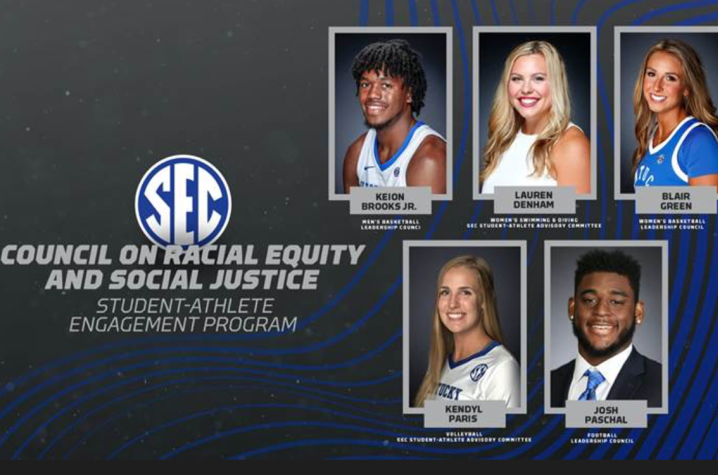8 UK Athletics Representatives Join SEC Council on Racial Equity and Social Justice

LEXINGTON, Ky. (Sept. 2, 2020) — The University of Kentucky will have eight representatives (five student-athletes and three staff) working with the Southeastern Conference’s newly created Council on Racial Equity and Social Justice, a league-wide body consisting of a diverse group of student-athletes, administrators, coaches and SEC staff.
Kentucky’s representatives on the SEC’s existing student-athlete engagement program include Josh Paschal (Football Leadership Council), Keion Brooks Jr. (Men’s Basketball Leadership Council), Blair Green (Women’s Basketball Leadership Council), while Lauren Denham (Women's Swimming and Diving) and Kendyl Paris (Volleyball) are on the SEC Student-Athlete Advisory Committee.
Gymnastics Head Coach Tim Garrison and Men's and Women's Track and Field/Cross Country Head Coach Lonnie Greene will serve alongside other league head coaches, while Melissa Gleason, UK executive associate director of athletics and chief financial officer, will serve at UK’s representatives among the university administrators.
“This is really important and I’m excited to be a part of the Student-Athlete Engagement Program,” Paschal said. “This program gives the student-athletes a voice so that Commissioner Sankey and our schools’ athletic directors know how we are thinking on topics and issues in our sports. We need to continue building these relationships so we can make decisions that help serve the student-athletes in the best way possible.”
The council will identify resources, outline strategies and assist with implementation of efforts that, when taken together, will promote racial equity and social justice, while also fostering diversity, helping overcome racism and pursuing non-discrimination in intercollegiate athletics.
"I’m proud to be part of the SEC’s effort in the pursuit of creating a better future," Greene said. "In this moment where we’ve seen a powerful movement emerge across the country, we hope the conversations we have, and recommendations we make, will help move us toward everlasting change relating to equal treatment of all traditionally underrepresented groups across society including in our field of intercollegiate athletics.
"As (SEC) Commissioner Greg Sankey said, the council will serve as a guide to the conference’s development of an action agenda built on the foundation principle ‘that all are created equal.’ Our work will help ensure this truth echoes loud and clear throughout 'our stadiums, our arenas, our campuses, our communities, our states and our nation.'"
Members of the council include individuals from within the conference's existing student-athlete engagement program — a multi-faceted effort involving more than 60 student leaders in football, men's basketball, women's basketball and all other SEC sponsored sports. Racial equity and social justice will be required discussions during all student-athlete leadership and advisory council meetings, while those groups' chairs, vice chairs and/or other identified leaders will participate in council meetings.
"I’m very much looking forward to serving on the SEC Council on Racial Equity and Social Justice," Garrison said. "Working toward the goal of equal opportunity for all is a fundamental idea that we should all strive to achieve. With input from student-athletes, coaches and administrators of our UK community, I will work with my fellow council members to identify areas we can make meaningful and lasting change."
The council, made up of administrative leaders from each campus and head coaches from each SEC sport, will regularly meet with SEC student-athletes to better understand and respond to their questions and concerns.
Alongside student-athletes, the SEC has used the past several weeks to gather and understand perspectives from a range of stakeholders across its 14 campuses, including presidents and chancellors, directors of athletics, senior woman administrators, faculty athletics representatives, various sport head coaches, mental health professionals and the SEC staff.
Those discussions helped create a framework for the council, which will provide ongoing guidance to the SEC office and updates to conference leaders at regular intervals. The council will initially focus on the following five strategic areas:
- Increasing Access and Representation for Underrepresented Minorities
- Providing Enhanced Support for Underrepresented Minorities
- Improving Education on Racial and Social Issues for All Stakeholders
- Deepening Commitments to Local Communities
- Raising Awareness of Racial Inequity and Social Injustice
Among other efforts, the council will be tasked with identifying resources related to racial equity and social justice for educational and professional development programs for athletics department staff, coaches and student-athletes; outlining support mechanisms for underrepresented minorities within the athletics department; and identifying opportunities for the SEC to bolster ongoing university and athletics department diversity, equity and inclusion initiatives. In addition, the council will advise athletics departments and the conference office on ways student-athletes, coaches and staff may fulfill their ongoing civic responsibilities in the electoral process.
"An important movement has been ignited around the equitable treatment of all underrepresented minorities, and the SEC is determined to be a leader in the pursuit of meaningful and lasting change," said SEC Commissioner Greg Sankey. "With the council as our guide, we will develop an action agenda built on the foundation that all are created equal and ensure this truth echoes across our stadiums, our arenas, our campuses, our communities, our states and our nation."
As the state’s flagship, land-grant institution, the University of Kentucky exists to advance the Commonwealth. We do that by preparing the next generation of leaders — placing students at the heart of everything we do — and transforming the lives of Kentuckians through education, research and creative work, service and health care. We pride ourselves on being a catalyst for breakthroughs and a force for healing, a place where ingenuity unfolds. It's all made possible by our people — visionaries, disruptors and pioneers — who make up 200 academic programs, a $476.5 million research and development enterprise and a world-class medical center, all on one campus.




